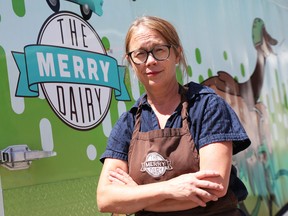Rules are not about safety. Giving market dominance to larger players at the expense of consumer choice

I love ice cream I recently learned how to make it at home so I can use natural ingredients and unique flavor combinations not found elsewhere.
Just a few months ago, I've noticed that the freezer section of the grocery store seems loaded with different options. His four big companies in the Canadian ice cream industry: Unilever, David Chapman's Ice Cream Limited, Agroper Dairy Cooperative and Nestle Canada Inc. Only two of them are Canadian companies.
Recently, her Merry Dairy, a local ice cream producer, was forced to close its wholesale distribution operations by Ontario Department of Agriculture, Food and Rural Affairs (OMAFRA) officials. If she doesn't, owner Marlene Hurley will face a fine of $1,000 per day. In a short time, she had to coordinate the logistics of carrying hundreds of pints of ice cream from her local store.
Last year, another Ottawa-area ice cream producer and her Pascale's Ice Cream, the "Queen of Ottawa's ice cream" according to Ottawa citizen Laura Robin, did the same. I had a problem. Her owner Pascale Berthiaume had to take all the ice cream out of her 15 stores where she sells.
In both cases, you can sell milk ice cream in your store (retail and online), but you can also sell it across the street at another store, or if that store sells it on your online site. They are breaking the law by selling them. Apparently, changing a product from one freezer to another makes it unsafe for sale. We do not allow wholesale (retail and online) sales to other companies unless you have a dairy factory license. Modifications to production equipment to meet the requirements of this license can cost hundreds of thousands of dollars.
In his recent CBC article, an OMAFRA spokesperson stated that the only requirement to be licensed under the Milk Act is that companies selling dairy products must to ensure that it meets the "high food safety standards" of
This is not about safety, it's about allowing larger players to control the industry at the expense of consumer choice. As a result, our selection in the grocery freezer is very vanilla, small-batch and uniquely flavored, and truly artisanal businesses continue to face ridiculous bureaucracy and lack of scaling.
We have seen flexibility in many areas during the pandemic. For example, liquor rules were changed to help businesses survive by allowing alcohol to be sold through various channels such as UberEats. Why don't dairy regulations show the same level of flexibility and intelligence? If bureaucrats could see further than their noses, this would be seen as a triple win. Milk ice cream sales will increase, dairy farmers will have more business and consumers will have more choices.
It is time for his local MPP to introduce the Ontario Milk Act into this century and advocate for the growth of true small businesses in Ontario. Less vanilla and more passion fruit.

Sign up to receive daily headline news from Ottawa Citizen, a division of Postmedia Network Inc.
Thank you for registering.
Sending welcome email. If you don't see it, please check your spam folder.
The next issue of the Ottawa Citizen Headline News will arrive in your inbox shortly.


